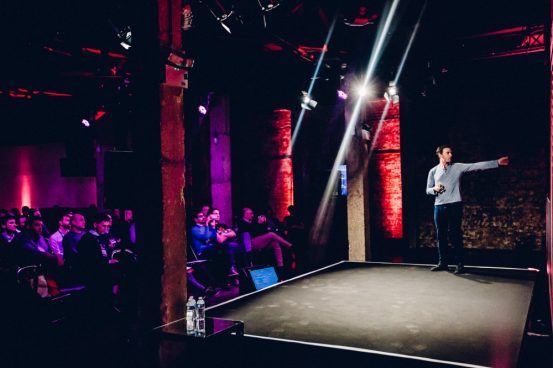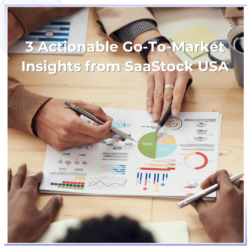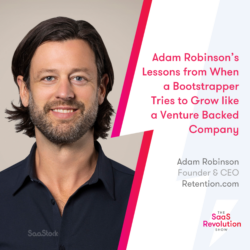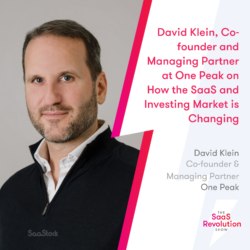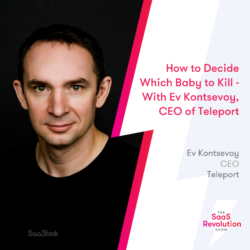According to Florian Douetteau, CEO of Dataiku, a French SaaS company has 2 options. One is to remain French for as long as possible, steadily growing up to €5 — €10 million. Not a bad outcome at all.
However, if it then decides it wants to be a global SaaS tour de force, it’s in for a bigger than usual struggle. Because at this stage, the company is a little too European, its speed is a bit too slow for the US market’s whirlwind dynamics, and the product is a little too tailored for local rather than global use.
Florian had struggled through that first option.
When he started Dataiku 5 years ago, he went for what he believes is Option 2: becoming global from day 1.
When you listen to Florian tell that story, you are struck with how ordinary he makes it sound. It has been hard and has required a meticulous strategy, but what he clearly alludes to is that it hasn’t required a skill or ability that only he possesses.
Florian’s story can be anyone else’s!
Putting people like Florian on the SaaStock stage is one of our core values. People with extraordinary achievements that are humble about them and open to share the lessons learned and strategies applied. So no one else has to waste time figuring out what they went through.
Florian is one of 23 superb speakers taking the stage at SaaStock on Tour in Paris on May 3rd. By looking at their stories we have extracted the following 5 steps to turn your SaaS into a global tour de force. Consider it merely a taster for what you will get from the conference and then grab a ticket while we still have them.
Have a local stamp of approval
With less than a dozen employees Florian packed his bags for New York. Initially it was metaphorically speaking. He hired a few Americans in Paris to help him speak American. They had the lingo, mentality and accent to attract US companies. Once the company grew a little bit but definitely before sense and sensibility may dictate, he sent two of them to establish the New York office. The following scale was an expensive ordeal so he had to fundraise a few times, with two of the rounds led by US investors.
These US investors would prove vital as the small team from an unknown French data company with a peculiar name picked up the phone and started calling. Having this US stamp, both with local employees and local investors, helped Dataiku sign the likes of National Public Radio, Sephora, and General Electric. Last year, however, Florian had to rebuild the US team from scratch. To know why, and most importantly, how he did it — tune in on May 3rd.
Treat it like an experiment
Packing bags literally is what Bjoern Zinssmeister, CEO and co-founder of Templarbit, did 8 years ago when he decided that the tech fun is to be had in Silicon Valley. But the European entrepreneurial DNA of thinking global from day one was always present in him. Building Templarbit from Silicon Valley, Bjoern has had an outward look from early on. But his key has been to approach it as an experiment he is willing to fail with.
He could afford one failure at a time, which is why he aimed at expansion to one country at a time. For him it was going across the Pacific into Japan. It was carefully picked, rather than on a whim. He crafted his own story — a Y Combinator graduate, who had learned a massively important lesson after gracefully shutting down his previous startup and returning the money to investors, was expanding to Asia. Before you think the key to his success was attending YC, think again.
Network online and offline
What was key in Bjoern’s story is that he started talking to the Japanese community in SF to ask for advice how to approach the Japanese market. That created a buzz among them and the companies they introed to Bjoern. A Silicon Valley based cybersecurity company was choosing the Japanese market as its first expansion. Everyone there wanted to know about Templarbit. Even the likes of Mitsubishi. Though they would prove a bite a little too big to chew.
Spending time talking to people and building that sort of network is exactly the thing that propelled Rachel Delacour to SaaS stardom with BIME Analytics. Starting from her parent’s bedroom in Montpellier she knew she had to create opportunities for herself. The breakthrough happened when she managed to get a spot on a presidential visit to Silicon Valley and met with Google. From then on she has used every opportunity to grow and network and be out there and be seen. That would help when she set up her first US office in unlikely Kansas City.
There she experienced a similar thing to Bjoern — the local community was fascinated by the exotic new company in town. It helped with hiring. But it was her already established network that produced the best leader for the US office. That constant zeal and commitment to networking eventually led her to Zendesk and the dream acquisition offer. She did all that being married to her co-founder and having two children in the process. Of course not everything went smooth. She made some very short term decisions like not investing in lawyers and visas, not visiting the Kansas team often, and not ensuring the company culture transcends borders.
Don’t outsource the important bits
Neither Dataiku’s, nor BIME’s platforms ever had French versions. It was one clear way of sending the message they were born global. Algolia, arguably one of France’s biggest SaaS success stories, did the same. Language is the first vital point in the playbook for internationalization of VC powerhouse Accel, which it helps portfolio companies apply. One Partner who has been instrumental in that effort is Philippe Botteri. The frenchman first moved to Silicon Valley in 2003, only to come back to Europe in 2011.
That experience helped him learn a few very important truths when it comes to both US and European mentality. Key in every successful scale has been one fundamental decision — not falling for the temptation to outsource sales or marketing. They are far too important parts of the company and need to be instigated by people who know the company and its values. None of the companies mentioned here have done it. Fullstop.
Build product for global contendership
However, an important point Phillipe makes is that, in the end, going global isn’t the only way. Staying and growing local can still be a path to becoming a SaaS powerhouse and a tour de force. There are industries that are big enough to allow that. Healthcare is one of them, as is the case for Alan. While the company is disrupting health insurance by making it digital locally in France, the platform has the product design of a company fighting for global turf.
To fuel that Jean-Charles Samuelian, founder of Alan, started off with a €12M funding and has just closed another €23M Series A round. Jean-Charles has used it to create design and product experiences worthy of a global contender. Half the company is made up of designers and engineers who have done profound user research, worked with clear personas in mind, established first principles, built only what is needed and fake what isn’t, and iterated in 5-day sprints.
As you can see, we won’t try to seduce you with Silicon Valley coolaid, which offer flashy stories that entertain but bring very little relevant knowledge what to do tomorrow. Instead we gather speakers that tell just how they increased MRR, fundraised, built incredible products and used every thing out there to fuel their growth. It’s tactics and tips, not chest bumps and high fives. It’s real talk from beginning to end right at your doorstep in Paris.
Grab a ticket while we still have them and come learn from Florian, Rachel, Bjoern, Philippe, Jean-Charles and 18 other spectacular speakers. Magic happens in the conversations that follow with fellow attendees.
